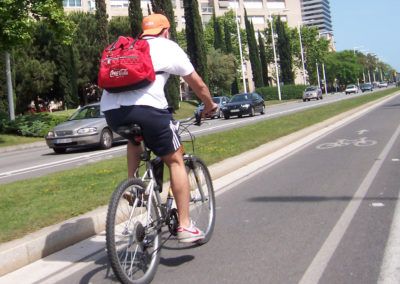Do you know what an eco-friendly footprint is and why it is so important to consider it when traveling? The ecological footprint is a great and reliable indicator to know the real sustainability of human activities on planet Earth. Therefore, in this concept we add everything that can affect our planet: the earth’s surface, biodiversity, the sea surface and the atmosphere.
All the actions of our daily life, from what we eat, how we dress, what means of transport we use, how we shop, how we manage the energy of our home, what holidays we take, how we travel … all that we do affects our ecological footprint.
In this post we will focus on travel and give you 6 tips so that when you travel, try to reduce your ecological footprint as much as possible! We all need to understand the importance of traveling in the most sustainable way.
> Do you know if you are very sustainable while traveling? Take our test to find out!

1. Make your stay in an ecofriendly and sustainable hotel or hostel
One of the most feasible options we have for reducing our ecological footprint while traveling is to stay in an ecofriendly hotel or hostel that is sustainable. Choosing a place that respects the environment around them is very, very important. Make sure the hotel or hostel you choose has solar panels, reuses water, has green areas, uses LED lighting, or makes good use of recycling. That way you will be responsible for your eco-friendly footprint!
2. Look for animal-friendly experiences!
Many times, when we travel, we are unaware of the impact we are having at the moment on native animals and plants. For example, we can go to a stream in Montseny without knowing that this can affect the survival of the Montseny newt! Therefore, it is very important to inform us well before traveling and, as far as possible, to carry out experiments that respect animals and plants, as is the case of CRAM: a center where marine animals are rehabilitated!
3. Buy food and souvenirs at local markets
One of the most important factors when traveling is to be able to participate and help the local economy. Therefore, we all need to make a good effort to buy coffee at a local bar or cafe, or to buy dinner at a local market (in fact, this will also help us to know their culture, their customs and typical local food). In addition, we can also find a lot of souvenirs in the local markets. Take advantage!
4. Always carry a bag to minimize waste
Today we can no longer afford to constantly generate plastic waste. Our planet is in danger, and that is a reality! We’ve all seen pictures of beaches full of bottles or bags, sea turtles confusing plastic bags with jellyfish, or pictures of plastic islands in the Pacific Ocean. To avoid this, it is important that we travel with a sustainable mindset: we do not need all these plastics if we are well organized. We can also carry a cloth bag to put our shopping in and try to minimize this waste as much as possible!
5. Learn from the culture of countries and cities
When we travel to other cities or countries, we learn about their culture and way of life. We can also use this learning to minimize our ecological footprint! If we know other lifestyles that involve less environmental impact, we can decide to adapt them to our lives and thus be more responsible for the environment.
6. Choose a sustainable means of transportation
Globalization has made it possible for us to move to almost any country in many different ways! Having so many mobility options also means that we have the perfect opportunity to choose a more sustainable one. For example, you can use the train, subway, bus, or bicycle to get around and discover the region you’ve been to! If you decide to take the car, you can choose to take more people to the same place as you, and that way you will pollute much less.
What did you think of all these proposals? You don’t have to do them all at once, because sometimes it can be tricky. Start by focusing on one of these points and everything else will come rolling! Help us make the world a better place as you travel!










